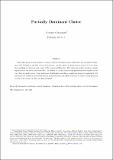Partially dominant choice
Abstract
This paper proposes and analyzes a model of context-dependent choice with stable but incomplete preferences that is based on the idea of partial dominance: An alternative is chosen from a menu if it is not worse than anything in the menu and is also better than something else. This choice procedure provides a simple explanation of the attraction/decoy effect. It reduces to rational choice when preferences are complete in two ways that are made precise. Some preference identification and choice consistency properties associated with this model are analyzed, and certain ways in which its predictions differ from those of other recently proposed models of the attraction effect are also discussed.
Citation
Gerasimou , G 2016 , ' Partially dominant choice ' , Economic Theory , vol. 61 , no. 1 , pp. 127-145 . https://doi.org/10.1007/s00199-015-0869-8
Publication
Economic Theory
Status
Peer reviewed
ISSN
0938-2259Type
Journal article
Collections
Items in the St Andrews Research Repository are protected by copyright, with all rights reserved, unless otherwise indicated.

